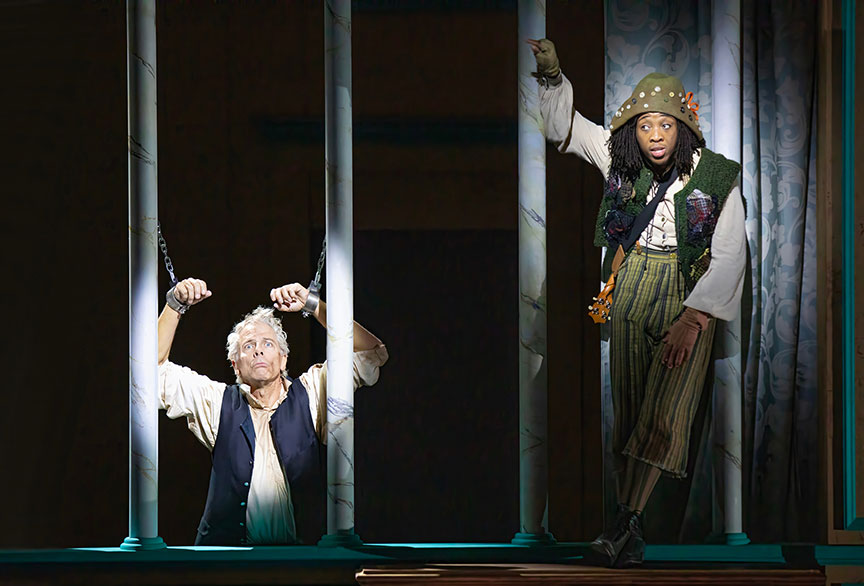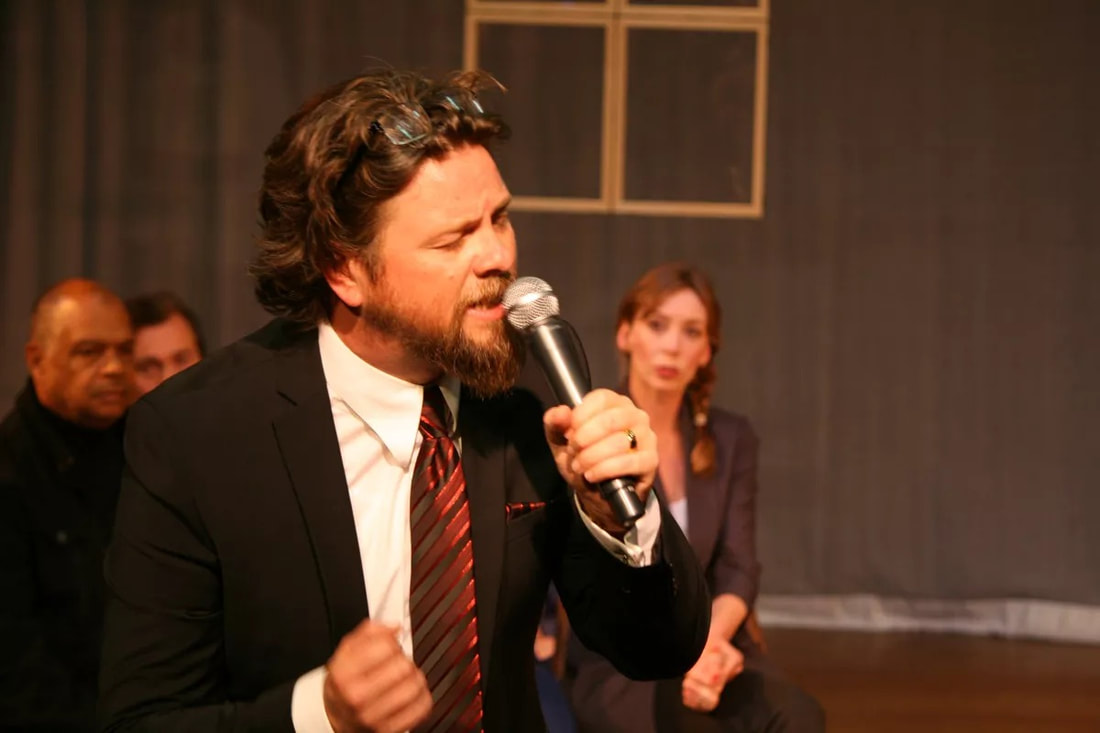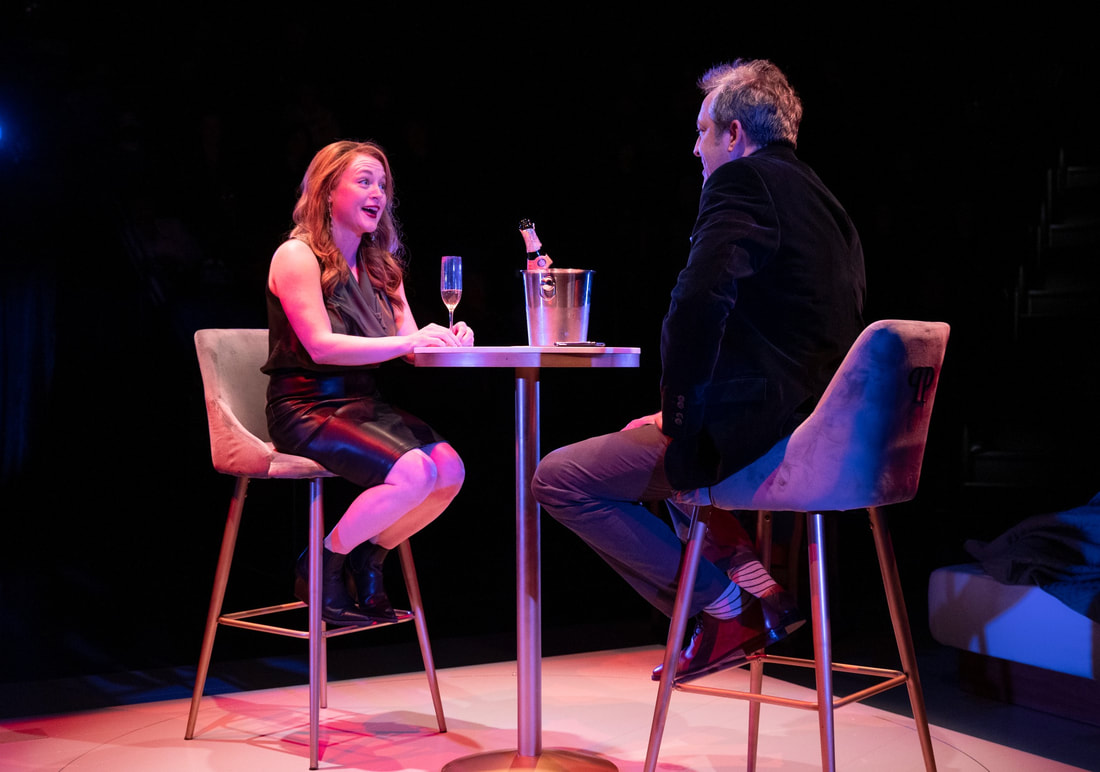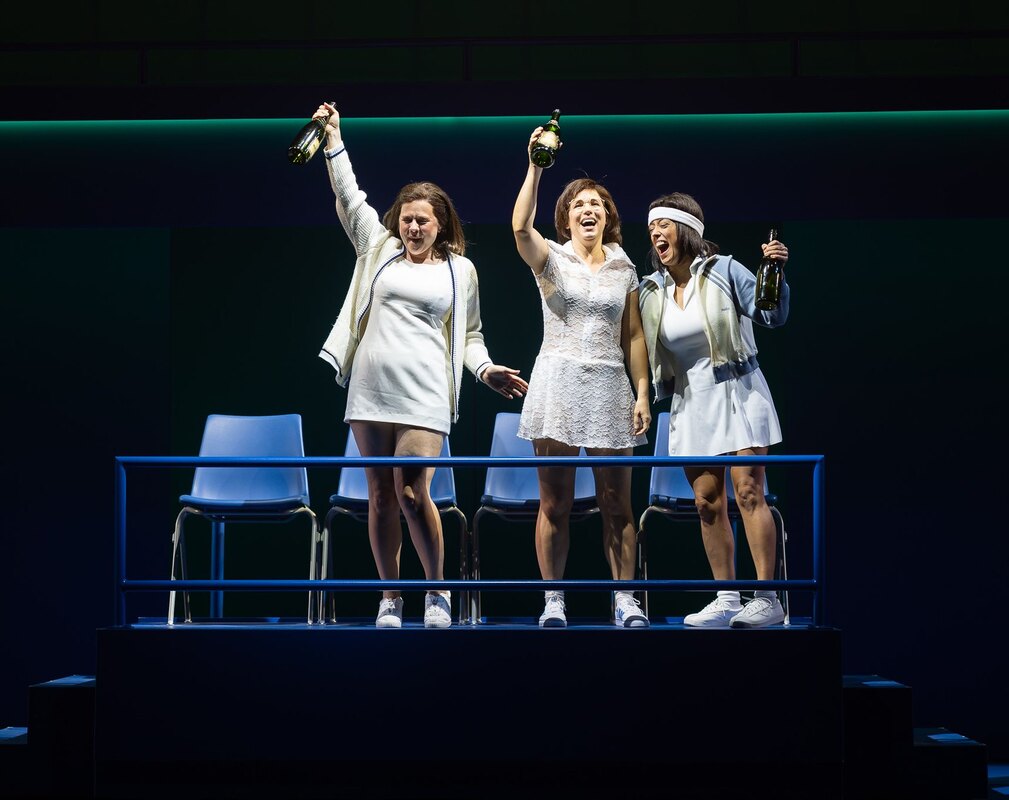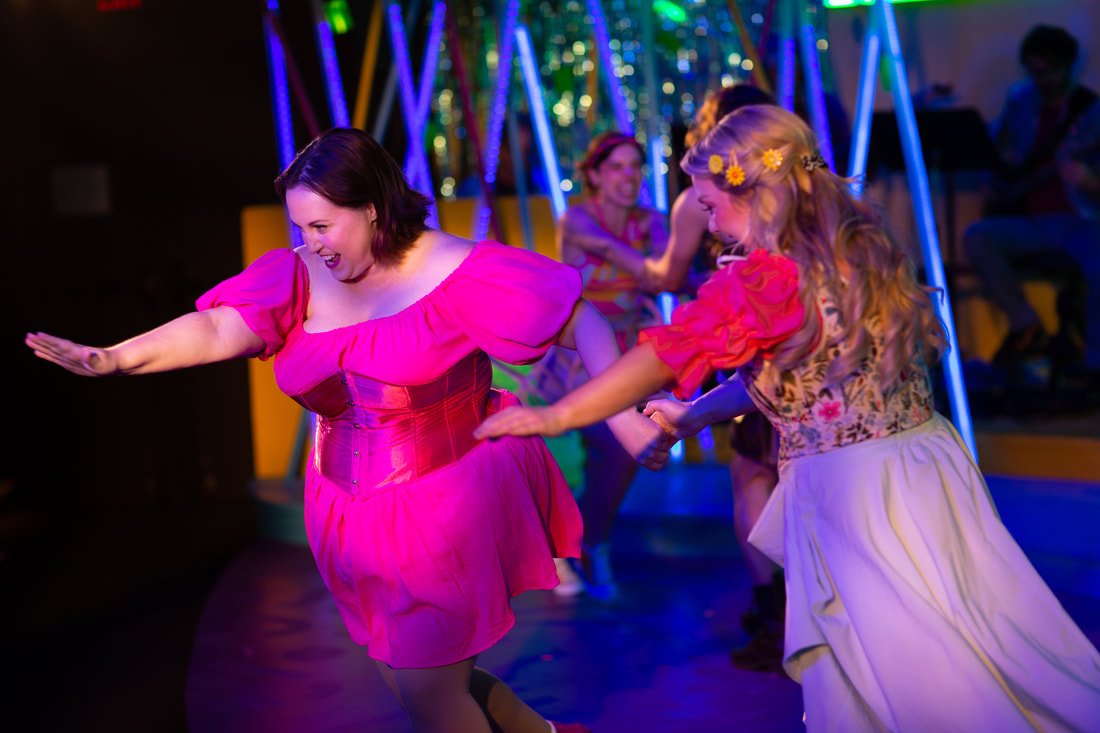|
The six wives of "Six the Musical." Photo by Joan Marcus Went to a pop concert Wednesday night and a history lesson broke out. Verily, “Six The Musical” is both – a lot of high-octane pop music and a little Tudor history.
Broadway San Diego is presenting the national tour of “Six,” which was written by two British students, Toby Marlow and Lucy Moss, for the Edinburgh Fringe Festival of 2017. It premiered in the West End two years later and on Broadway in 2020 just before COVID-19 sent everything to hell in a handbasket. It would officially open there in October of 2021. That’s the history of “Six’s” creation and development. The 80-minute musical’s own history – or “her-story” as its cast members call it – is that of the six wives of King Henry VIII, amped up sonically and recounted with a contemporary sensibility and lyrics to match. You know what? It works. “Six” is a thoroughly engaging show with palpable pop music hooks, humor and even a few moments of pathos. The six wives subjected to the narcissism and cruelty of Henry VIII are presented as pop divas channeling icons from Beyonce and Adele to Nicki Minaj and Ariana Grande. After a kinetic opening in which they convey the premise of the evening (“Ex-Wives”) – that each one will have her turn in song to show that she was most abused in her royal marriage – the wives’ proceed in historically chronological order to do just that. Catherine of Aragon (Khaila Wilcoxon) gets things started, all but demanding in her “No Way” number to be crowned most ill-treated. She’s followed by Henry’s Wife No. 2, Anne Boleyn (Storm Lever), who even reluctant history students know suffered the unkindest cut of all from her husband – she was beheaded. Lever’s “Don’t Lose Ur Head” is obviously sardonic but undeniably defiant too. Lever, seen at the Old Globe in “Almost Famous” and more prominently in the theater’s 2021 staging of “Hair,” is a needle-sharp comic presence throughout the show. The transition to Natalie Paris as Jane Seymour, Wife No. 3, brings a change of pace. The longing and forlorn ballad “Heart of Stone” may be “Six’s” best-known tune, and Paris, who otherwise during the evening is quite funny herself, sings the royal heck out of it. Anna of Cleves was the wife that Henry recruited from outside England, though when the German-born Anna met him face to face, he rejected her emphatically. Not as pretty as her portrait, the tyrant’s thinking went. As though giving Henry and superficial men everywhere a middle finger and having a ball doing it, Olivia Donalson romps through “Get Down.” And get down she does. My personal favorite queen moment of the night. Oozing sex appeal as Katherine Howard, Courtney Mack’s “All You Wanna Do” is a fitting bookmark to “Get Down,” also indicting Henry VIII as a user when it came to his wives and women in general. Mack, with her Ariana Grande high ponytail in motion, makes it more sensual than incensed. Catherine Parr was Henry’s sixth and final wife – he died a year before she did. Gabriela Carrillo’s “I Don’t Need Your Love” is a rebuke of the king, who forced her to marry him when she was in love with Thomas Seymour, a brother of Jane’s. Before her song, Carrillo’s Parr suggests that a competition to see who was most victimized is a wrongheaded idea. Which it is. The attempt to transform the tone of the show into an empowerment statement doesn’t fully come off, however. Before you know it, it’s back to the flash with the ensemble performing “Six,” a percussive finale with a flamboyance that would gladden the hearts of Vegas regulars. Neither being conversant in British history nor enamored of power pop is necessary to enjoy “Six.” It’s easy to like and, for some, to love. My niece and her best friend are already planning to see it again. “Six the Musical” runs through July 9 at the Civic Theatre downtown.
0 Comments
Greg Germann (left) and Esco Jouley in "Twelfth Night." Photo by Jim Cox I haven’t seen “Twelfth Night, or What You Will” 12 times yet, but they’re adding up. The new production at the Old Globe Theatre directed by Kathleen Marshall makes at least three “Twelfth Nights” for me in the last seven years.
This isn’t a problem by the way. I always enjoy “Twelfth Night,” which I like to think of as The Bard’s sitcom comedy. It’s silly. It’s rife with broad sight gags. Its strictly-comic subplot characters (Sir Toby Belch, Sir Andrew Aguecheek, Feste the fool and the head servant Malvolio) are by far the play’s most diverting figures. They’re spit-laugh funny, too. (So be careful with your sippy cup wines.) Even if you’ve seen “Twelfth Night” as many times as I have. The Globe’s latest staging of “Twelfth Night” (the last was in 2015) in the outdoor Lowell Davies Festival Theatre couldn’t have asked for better actors to fill and have supreme fun with these roles: Cornell Womack’s Sir Toby is loud, boozy and delightfully anarchic; Jason O’Connell takes the jig and leg-kick to hilarious heights as the foppish Sir Andrew; Esco Jouley is the sort of jaunty house clown you’d love to have do all your mischief work for you, and they can sing too; Greg Germann’s Malvolio is stammering, twitching, self-loving … I could keep going. Germann wrings every inch of pomposity out of the character whose appearance in yellow stockings and cross garters may be every “Twelfth Night’s” ultimate comic moment. What transpires with the main characters in the play, the romantic and mistaken-identity machinations involving the nobleman Orsino (Biko-Eisen Martin), noblewoman Olivia (Medina Senghore) and brother-and-sister Viola (Naian Gonzalez Norvind) and Sebastian (Jose Balistrieri), is strictly predictable and practically dull compared to the antics of Sir Toby and company. That said, the cast members portraying them are talented in their own right, with Senghore, who does a sensational swoon across a bench in Act One, the most memorable. This “Twelfth Night” I found less enchanting than the 2015 staging here directed by Rebecca Taichman. Riccardo Hernandez’s gorgeous scenic design with its pools of water and giant red roses was unforgettable as were the costumes by David Israel Reynoso. But the 2023 “Twelfth Night” can hold its own. The Moroccan style backdrop by Lawrence E. Moten III is more of a grand, majestic court, and the set can be rotated for changing scenes and locations in the story. Michael Krass’ costumes, too, and Stephen Strawbridge’s lighting design are thoughtfully conceived. Fine. I’ve seen “Twelfth Night” again and I’ve enjoyed it again. I need a break. Bring on “The Merry Wives of Windsor,” which begins at the Festival Theatre on July 30. I think I’ve only seen that twice before. “Twelfth Night” runs through July 9 at the Old Globe’s Lowell Davies Festival Theatre. Richard Baird in "Public Enemy." Photo courtesy of New Fortune Theatre Company New Fortune Theatre Company’s “Public Enemy” is remarkable for two reasons in particular: First, that the adaptation by David Harrower (“Blackbird”) succeeds in compacting Henrik Ibsen’s sprawling five-act “Enemy of the People” into a swiftly moving 90 minutes and sacrifices none of the essence of the original text. Second, a fervent performance by New Fortune Artistic Director Richard Baird (who also directs “Public Enemy”) that at its crescendo in a relentless diatribe manifests Ibsen’s thrust about the lonely heroism of bearing the truth.
What was true about the original “Enemy of the People” is just as true in “Public Enemy”: The majority don’t want the truth, and the politicians and power brokers look out only for themselves. If New Fortune’s “Public Enemy,” rich with spirited performances as it is, wasn’t so consistently entertaining, it might otherwise be deflating in making its inescapable points. Like: What was so in Ibsen’s Norway of the late 19th century is just as so today in … let’s use America as an example? Yet you come out of this show staged in a small theater at Westminster Presbyterian Church in Point Loma drained from the emotional investment made in Baird’s desperate Dr. Thomas Stockmann but at the same time on a high from the energy of the production. Ibsen’s premise for “Enemy” was straightforward. Stockmann, who is chief medical officer of a spa in a town that is reaping the financial rewards of its popularity, discovers and then verifies that the baths’ waters are poisonous with bacteria. He is determined for the welfare of his fellow citizens to blow the whistle, to put it in contemporary parlance. But there are immediate complications: Stockmann’s brother and rival Peter is the mayor. His father-in-law owns the tannery from which most of the toxins are flowing. At first supported and championed by the editor of the local newspaper and certainly by those in his sphere, Stockmann will prove no match for the wieldings of his power-hungry brother and the town businessmen. All but his wife and three children and a close seafaring friend will turn on him. It’s thrilling, especially in a close space like that in Point Loma, to watch the shifts of mood, intensity and mindset in Baird’s portrayal of Stockmann: elated, initially, at the realization of his discovery; indignant at the resistance and pushback from his brother; simmering with a desire to fight, even destroy said brother in retaliation; incredulous, almost speechless, from the betrayal by his friends; resigned – but just briefly – to his report being quashed before a public hearing; and then a fierce and exhausting monologue, with microphone – an indictment of the stupidity in his midst, a manic confrontation with his being indeed a “public enemy”; and nearly a descent into madness. It’s a triumphant performance. Nick Kennedy makes a formidable adversary as Peter, smug and superior and threatening. As Hovstad, editor of the local Reformer, Trevor Cruse credibly accomplishes the transformation from ally to spineless turncoat. There are fine turns, too, from Neil McDonald as the compromising head of the local businessmen’s association and Amanda Schaar as Stockmann’s wife Katrine. “Public Enemy” addresses the question “What can one man do?” The answer is complicated … and devastating. “Public Enemy” runs through July 2 at Westminster Presbyterian Church in Point Loma. Caroline Neff and Ian Barford in "Another Marriage." Photo by Michael Brosilow I’d always wanted to attend a performance at the Steppenwolf Theatre in Chicago, so, finding myself on vacation for a few days in the Windy City, I bought tickets to a Wednesday evening performance of Kate Arrington’s world-premiere dramedy “Another Marriage.”
Arrington is an ensemble member at the Steppenwolf, and this staging of her first play is directed by another ensemble member, Terry Kinney. Alas, “Another Marriage” is a troubled, incomplete-feeling work that wallows in excess messaging and designed “significance” and is not helped by characters who almost to a person are patently unlikable. The opening scene is a promising meet-cute on Steppenwolf’s stage in the round between Nick (Ian Barford) and the ironically named Sunny (Judy Greer). She’s prone to exasperation and fond of f-bombs but is somehow disarmed by a persistent Nick, whose ultimate gesture of wooing her is taking off all his clothes, exposing a less than Adonis like form, before asking her on a date. I don’t think I expected nudity in the first 15 minutes of the play, but that’s fine. It grabs one’s attention, no question. The courtship of Sunny by Nick leads quickly (too quickly?) to married life and you just know that’s going to be fraught with pitfalls. Nick is a “serious writer” who has regular creative blocks will never be – he admits -- commercially successful. Sunny has deeply personal writing ambitions of her own but her frustration and preoccupation get in the way of her productivity. Watching a play about writers has always been laborious for me. They’re invariably portrayed as name-droppingly pretentious or “endearingly” neurotic and we never actually see them write because watching a character write is, well, boring. Nick and Sunny argue a lot and trade pungent observation about peers, academics and Henry James and even make a baby, Josephine, who is named for the mother who tragically lost her life upon giving birth to Sunny. The presence of the baby in the home only brings Nick down, and soon he’s at a cocktail table flirting with a literary agent’s assistant named Macassidy (Caroline Neff) who’s making a daffy attempt at seduction. Quick as a flirty wink, Nick leaves Sunny and baby Josie for Macassidy (bad name, by the way). While all of this is going down in an over-long first act, the grown Josie, or Jo (Nicole Scimeca) stands or sits on the perimeter of the stage with her iPad, digitally monitoring these machinations and reminding the audience (on an overhead display panel) of passages of time or the thrust of each scene. It isn’t until Act 2 that Jo becomes a genuine character, and when she does she spends most of her time telling the audience her grandmother’s story as a means of “completing” the woman’s life in her own name. Nick, self-involved and in love with his own voice if not his own writing, is rarely ever a sympathetic figure even when he tries to do what he thinks “the right thing” is. Barford seems comfortable enough in this skin. Greer’s Sunny is a prodigious swearer (and later a sobber), refusing to play the victim but definitely acting like one. Neff’s Macassidy grows up and grows wiser in the second act, and when she discovers as Sunny did that Nick can’t be relied upon in a marriage for anything but interest in himself she emerges as “Another Marriage’s” one adult character to invest in. Arrington has over-reached with this script, trying to be literary and psychologically probing and cute (Josie has a pet snail) all at the same time; it’s unclear to me through whose eyes we’re seeing all the various interrelated conflicts. Sunny would seem to be that person, but her character is always getting in her own way, lost in a slow burn of love, anger and depression. It's telling that the audience does not know if or when to applaud at the end of the first act or at the end of the play itself. That was the case at least on the night I was there. The Steppenwolf staging is thoughtful enough, employing moody recorded music, depictions of text exchanges on the digital display and spare but useful props. I wanted to like this production as much as I liked the Lincoln Park theater itself. Didn’t happen. “Another Marriage” needs another rewrite. “Another Marriage” runs through July 23 at the Steppenwolf Theatre in Chicago. Chilina Kennedy, center, stars as Billie Jean King in "Love All." Photo by Rich Soublet Growing up, the first female athlete I became aware of was Billie Jean King. As the years went by, I came to admire and respect her for much more than her dominance on the tennis court. She was and is a woman of courage, conviction and flat out guts.
So what a thrill to see her in person at La Jolla Playhouse on opening night of “Love All,” the world-premiere play by Anna Deavere Smith based on the 79-year-old King’s extraordinary life. When she was introduced from in front of the stage before the show by Playhouse Artistic Director Christopher Ashley, the audience gave her a loud standing ovation. Standing o’s are rife at most theater productions in town AFTER the performance, but this was the first time I’d ever seen one (or been part of one) before the performance even began. It’s a shame that this was the highlight of the evening. “Love All” looks and sounds like one of those television docudramas of a famous person’s life. King’s passions – for tennis, for fair pay for and equal treatment of woman athletes, for social justice, for the man (and women) she loved – feel overly scripted, hurried, expressed in bromides that I found surprising coming from the pen of the deservedly respected Anna Deavere Smith. King’s story, from childhood into the early 1970s, is dramatized in short mini-scenes directed as if for economy of time by Marc Bruni. (It’s a strange dynamic given that the play overall feels too long.) The while, projections above the stage (by S. Katy Tucker) chronicle the socio-political turmoil that paralleled King’s rise to tennis heights and her championing of critical causes. There’s the JFK assassination, the killing of Dr. Martin Luther King, the prelude to the assassination of Robert Kennedy, the Vietnam War. There’s Muhammad Ali explaining his refusal to kill in Vietnam. There’s the war itself. There’s Kent State. It’s a newsreel that at times overshadows the personal dramas of Billie Jean King being portrayed onstage, such as her relationship with husband Larry King and her exploration of her sexuality. The trip through history, onstage and on the screen, is tiring. A rewritten “Love All” might focus on any of several significant aspects of King’s life rather than trying to Tell It All. Throughout the play and at different ages, the role of King is entrusted to Chilina Kennedy, who is very righteous and quite good. Much as King’s doubles partner and friend Rosie Casals was the brash yin to King’s more serious yang, Elena Hurst, making her Playhouse debut, is just as strident for the cause but a lot more fun. She’s the kind of pal everyone would like to have. As King’s business-minded spouse Larry, John Kroft never seemed dynamic enough for me, while Nancy Lemenager as King’s manager Gladys Heldman, Bianca Amato as young Billie Jean’s coach/mentor Alice Marble and Ben Jacoby as men’s tennis icon Jack Kramer all border on caricaturization. One scene in the second act, which finds a soul-searching King at a retreat, is just silly, complete with misfired Bob Dylan/acid bartender joke. It also serves to weaken what ensues – a telling reunion between King and the “rock star” hairdresser she’d encountered earlier. What “Love All” gets right is its portrayal of the prejudice that Black tennis champion Althea Gibson was subject to – King’s outraged discovery of Gibson having to play a maid in a John Wayne western is one of the production’s few urgent moments – and of otherwise-revered icon Arthur Ashe’s dismissal of women players’ demand for equal pay. There is a lot of tennis history in “Love All,” and it certainly helps to be familiar with it. (King had significant involvement in the crafting of this script.) I find it engrossing, but non-buffs may not. Surprisingly, “Love All” references but does not revisit or act out the famous King vs. Bobby Riggs “Battle of the Sexes.” Instead, it ends with the dedication of the USTA Billie Jean King National Tennis Center, home of the U.S. Open Championship. Then actors, including Amato as King’s wife Ilana Kloss, break character and address the audience as though wrapping up the docudrama. Not ideal. Billie Jean King is worthy of many epic tellings of her life, such an important American figure has she been and still is. “Love All,” at least right now, is not worthy of her. “Love All” runs through July 2 at La Jolla Playhouse’s Mandell Weiss Theatre. Left to right: Lenne Klingaman, Chilina Kennedy and Elena Hurst in "Love All." Photo by Rich Soublet Growing up, the first female athlete I became aware of was Billie Jean King. As the years went by, I came to admire and respect her for much more than her dominance on the tennis court. She was and is a woman of courage, conviction and flat out guts.
So what a thrill to see her in person at La Jolla Playhouse on opening night of “Love All,” the world-premiere play by Anna Deavere Smith based on the 79-year-old King’s extraordinary life. When she was introduced from in front of the stage before the show by Playhouse Artistic Director Christopher Ashley, the audience gave her a loud standing ovation. Standing o’s are rife at most theater productions in town AFTER the performance, but this was the first time I’d ever seen one (or been part of one) before the performance even began. It’s a shame that this was the highlight of the evening. “Love All” looks and sounds like one of those television docudramas of a famous person’s life. King’s passions – for tennis, for fair pay for and equal treatment of woman athletes, for social justice, for the man (and women) she loved – feel overly scripted, hurried, expressed in bromides that I found surprising coming from the pen of the respected Anna Deavere Smith. King’s story, from childhood into the early 1970s, is dramatized in short mini-scenes directed as if for economy of time by Marc Bruni. (It’s a strange dynamic given that the play overall feels too long.) The while, projections above the stage (by S. Katy Tucker) chronicle the sociopolitical turmoil that paralleled King’s rise to tennis heights and her championing of critical causes. There’s the JFK assassination, the killing of Dr. Martin Luther King, the prelude to the assassination of Robert Kennedy, the Vietnam War. There’s Muhammad Ali explaining his refusal to kill in Vietnam. There’s the war itself. There’s Kent State. It’s a newsreel that at times overshadows the personal dramas of Billie Jean King being portrayed onstage, such as her relationship with husband Larry King and her exploration of her sexuality. The trip through history, onstage and on the screen, is tiring. A rewritten “Love All” might focus on any of several significant aspects of King’s life rather than trying to Tell It All. Several actors portray King as she grows up before the role is entrusted to Chilina Kennedy, who is very righteous and quite good. Much as King’s doubles partner and friend Rosie Casals was the brash yin to King’s more serious yang, Elena Hurst, making her Playhouse debut, is just as strident for the cause but a lot more fun. She’s the kind of pal everyone would like to have. As King’s business-minded spouse Larry, John Kroft never seemed dynamic enough for me, while Nancy Lemenager as King’s manager Gladys Heldman, Bianca Amato as young Billie Jean’s coach/mentor Alice Marble and Ben Jacoby as men’s tennis icon Jack Kramer all border on caricaturization. One scene in the second act, which finds a soul-searching King at a retreat, is just silly, complete with misfired Bob Dylan/acid bartender joke. It also serves to weaken what ensues – a telling reunion between King and the “rock star” hairdresser she’d encountered earlier. What “Love All” gets right is its portrayal of the prejudice that Black tennis champion Althea Gibson was subject to – King’s outraged discovery of Gibson having to play a maid in a John Wayne western is one of the production’s few urgent moments – and of otherwise-revered icon Arthur Ashe’s dismissal of women players’ demand for equal pay. There is a lot of tennis history in “Love All,” and it certainly helps to be familiar with it. (King had significant involvement in the crafting of this script.) I find it engrossing, but non-buffs may not. Surprisingly, “Love All” references but does not revisit or act out the famous King vs. Bobby Riggs “Battle of the Sexes.” Instead, it ends with the dedication of the USTA Billie Jean King National Tennis Center, home of the U.S. Open Championship. Then actors, including Amato as King’s wife Ilana Kloss, break character and address the audience as though wrapping up the docudrama. Not ideal. Billie Jean King is worthy of many epic tellings of her life, such an important American figure has she been and still is. “Love All,” at least right now, is not worthy of her. “Love All” runs through July 2 at La Jolla Playhouse’s Mandell Weiss Theatre. Gerilyn Brault (left) and Lauren King Thompson in "Head Over Heels." Photo by Andrea Agosto To fully enjoy “Head Over Heels,” it is necessary to accept the incongruity of characters speaking in blank verse one moment, then breaking into ‘80s Go-Go’s lyrics the next.
Once you’re past that, s’all good. Diversionary Theatre had planned to stage “Head Over Heels,” written by Jeff Whitty (“Avenue Q”) and adapted from Sidney’s text by James MacGruder, in the spring of 2020. Three years after the official acknowledgement of the COVID-19 pandemic, “Head Over Heels” is closing Diversionary’s 2022-2023 season. It also happens to be the swan song for Executive Artistic Director Matt Morrow, who’s departing to become artistic director at Center Repertory Company in Northern California. Morrow co-directed “Head Over Heels” with Steven Brotebeck, who directed a previous show built upon pop songs – “Girlfriend” with the music of Matthew Sweet – at Diversionary in 2019. Make no mistake: the Go-Go’s are more pop band than anything else, which is why their songs work so well in “Head Over Heels.” “Heaven Is A Place On Earth,” for one, has show tune written all over it. This is a strange but completely likable show. It’s based on Sir Philip Sidney’s 16th-century pastoral romance “Arcadia,” of all things. Basilius, king of the realm (Scott Ripley), is warned of by an oracle (Faith Carrion) that the “Beat” that keeps the kingdom intact is threatened. At the same time, he’s trying to marry off his older daughter Pamela (Gerilyn Brault) to a worthy suitor while shunning the shepherd swain (Joey Kirkpatrick) who’s eyeing younger daughter Philoclea (Adelaida Martinez). Basilius’ strong-willed queen Gynecia (Amanda Naughton) is frustrated by most of this and especially frustrated by her blowhard of a husband. When the shepherd is persuaded by the nonbinary oracle to dress in women’s clothes and Pamela learns that her handmaid Mopsa (Lauren King Thompson) is in love with her, two foundations of “Head Over Heels” become clear: The story has all the wild complications of a Shakespearean romp. And playwright Whitty is making a trenchant comment on gender identity, otherness and acceptance, which thrusts this show emphatically into the now. Throughout, Go-Go’s tunes propel the storytelling – at times appropriately, lyrically speaking; at other times apparently at random. I’m not a fan, per se, so some of the songs in “Head Over Heels” were foreign to me. About all of them, though, are accessible and compatible with the spirit of the show. The musical begins with the band’s best remembered tune of all – “We’ve Got the Beat,” setting the tone for not only the soundtrack of “Head Over Heels,” but the high-spirited choreography (by Katie Banville), well executed by the show’s large ensemble. There were some sporadic sound problems on opening night which undoubtedly will be corrected, though the five-member onstage band led by Patrick Marion rocked with nary a moment of unwanted feedback. The Diversionary cast is exceptional, starting with Brault, whose Pamela is a hoot and a holler. The high wig she wears in the first half of the show, looking like something Elton John borrowed from Effie in “The Hunger Games,” doesn’t detract from her comic timing or lovely singing voice. Twenty-three-year-old Martinez is a sweet and sweet-voiced presence throughout, and Naughton as always can do no wrong onstage. Berto Fernandez and Carrion wring maximum effect from their character roles. It seemed as if “Head Over Heels” never completely balanced its messaging with its antics. Both are very obvious, but in a show like this one, that’s okay. Call it a terrible cliché, but there really is something for everybody in this crowd-pleaser of a show. “Head Over Heels” runs through June 18 at Diversionary Theatre in University Heights. |
AuthorDavid L. Coddon is a Southern California theater critic. Archives
July 2024
Categories |
David Coddon |
|

